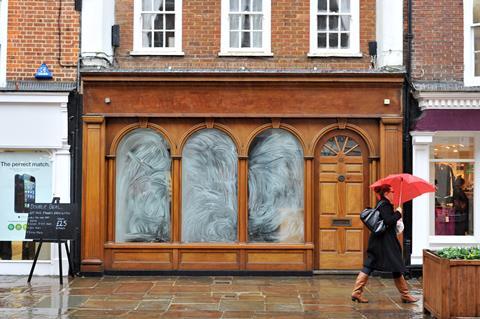Select committee report finds government had ‘insufficient evidence’ to press ahead with new residential permitted development right
A committee of MPs has said the government’s deregulation of town centre planning rules could leave high streets “unbalanced” by a wave of residential conversions.
A report by the housing select committee said that the government decision to introduce new permitted development rules this August, allowing the conversion of most high street premises to housing without planning permission, was done without “sufficient evidence”.

The committee used its report on the health of high streets through the pandemic to repeat its call for the department to launch a wide-scale review of the use of permitted development rights. The report said the review should look particularly at the impact of permitted development on high streets and town centres.
Planners and some developer groups are concerned that the rights, allowing almost unlimited residential conversion of shops, offices and restaurants, will see high streets decimated as commercial premises are replaced by homes.
The report, released this morning, said it had heard evidence that a consequence of extended PDRs could be “‘gap-toothed’ high streets, with long stretches between different businesses, which in turn makes the high street less viable.”
It concluded: “Housing has a valuable role to play in mixed-use high streets, but we are not convinced that extending permitted development rights from Use Class E to residential is the right way to address either the housing shortage or the regeneration of high streets and town centres.
It said the government’s approach “may introduce so much flexibility as to create an imbalance between housing and other
high street uses”, and that MPs were “not persuaded that the Government has sufficient evidence to justify extending permitted development rights in this way, without any pilots.”

The government has argued that the new PD right allowing “Class E” commercial properties to convert to homes protects high street uses because properties have to have been vacant for three months before the right comes into effect, while preventing long-term vacant properties.
Clive Betts, chair of the Levelling Up, Housing and Communities (LUHC) Committee (pictured), said it was “vital that Government facilitates a long-term, holistic approach both to the planning and to the regeneration funding of our town centres” in order to build resilient and thriving high streets.
The committee also found that the funding of town centre regeneration was “too complex, short-term, and fragmented” and called on the Government to combine funding into long-term settlements for councils, offering greater devolution of funding and powers.
A Government spokesperson said in response to the report that it had a multi billion-pound investment programme which will “transform towns and high streets into vibrant places as part of our efforts to level up all parts of the country.”
The spokesperson added: “The £830 million Future High Streets Fund is helping 72 places across England to build back better, and the £3.6 billion Towns Fund will upgrade high streets and local transport.”










No comments yet